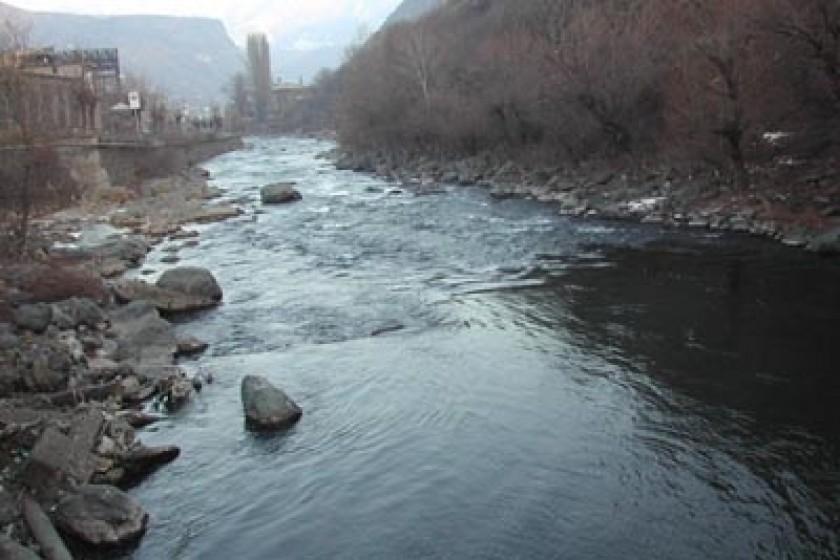
The Debed river basin begs to be cleaned
The ecological situation in the Debed river basin has gotten international attention.
Household garbage, sewage and industrial waste from the populated area of the basin are routinely dumped into the river.
Sanmakrum,CommunalArKand Sanashkhatank are private companies that collect garbage in Vanadzor. The heads of the companies maintain that they transport garbage to the waste dump located near thevillageofArjut. CommunalArKdumps some of the household garbage on land near the Southern part of the Vanadzor-Alaverdi highway. This 800-square-meter dump is located directly on the Pambak riverbank. The company won the tender to rent the land last May. It dumps household garbage here 10 to 15 times a month, and classifies and recycles it. CommunalArK’s executive director, Gagik Nazaryan, says that they never dump the garbage into the river.
“It’s likely that people themselves bring construction and household garbage in their cars and dump it into the river,” he told us, adding, “As far as the garbage collected in the land we rent near the river is concerned, it’s possible that during the spring floods wind blew the garbage into the river. But that doesn’t happen very often.”
Sewage from the populated areas of the Lori Marz is being dumped into the river as well.
All of Vanadzor’s sewage flows into the river, after only mechanical purification. The 35- year-old sewage treatment plant has hardly ever seen major repair. Because the equipment is worn out, 22,000 cubic meters of wastewater is dumped into the river without any biological or chemical purification. According to director Rudik Malkhasyan, the plant needs a $34,000 investment to function properly.
In Alaverdi the sewage treatment plant hasn’t been working for 15 years now, so sewage flows into the river without mechanical, biological or chemical purification. The residents of seven apartment buildings and a number of houses near the Sanahin railroad station have neither dumpsters nor a working sewage system. Household garbage and sewage go directly into the river. All the residents’ appeals and complaints meet the same response - there’s not even enough money in the budget for dumpsters. Sewage from the Sarahart district of Alaverdi, too, runs straight through pipelines into the river without passing through the sewage treatment plant.
The Vanadzor office of the Helsinki Citizens’ Assembly of Armenia is implementing a two-month project as part of the Partnership For Preserving The Debed Basin, funded by Development Alternatives, Inc. The organization has conducted a study of the pollution sources in the basin. In the land between Vanadzor and the community of Karkop, they identified 162 source of pollution, including household and construction refuse. Garbage and sewage from the trade and service organizations operating in vicinities of Vanadzor, Tumanyan, Alaverdi, Akhtala and Karkop go directly into the river. Among the sources of industrial waste dumped into the river are Prometheus-Kimprom CJSC in Vanadzor, Armenian Copper Program (ACP) CJSC in Alaverdi, and Metal-Prince CJSC in Akhtala.
Prometheus-Kimprom CJSC is not working now, so it doesn’t represent a threat to the ecology of the river at the moment. ACP CJSC takes 1,000 cubic meters of water a month from the river, uses it, and then dumps it, along with 1,500 cubic meters of potable water received from the Alaverdi water supply company (2,500 cubic meters altogether), back into the river.
In a response letter from the ministry of ecology, the Vanadzor office of the Helsinki Citizen’s Assembly was informed that ACP is not accounted for as a water user. This is because the copper producing company has simply changed its legal name (the agreement on set emissions limits with the company formerly known as the Manes-Vallex CSJC expired on January 1, 2003), and although the company is the same, it hasn’t signed an agreement under its new name. Thus, ACP is using water without the right to do so. According the company’s ecologist, the necessary papers are being drawn up.
The present state of Debed and its environs has, first of all, an effect on the population’s health. In various communities in the region the incidence of certain diseases is higher than the national average. Roza Machkalyan, head of the Alaverdi Maternity Welfare Clinic, believes that the general ecological situation has also affected the gene pool. For example, 45 pregnant women with anemia are registered in Alaverdi every year.
In response to its letter to the Lori Regional Department of the State Ecological Inspection of the Ministry of Ecology, the Vanadzor office of the Helsinki Citizen’s Assembly was informed that using water from the Debed river for irrigation can be dangerous as well. Because household and industrial wastewater is dumped into Debed without prior specific biological purification or neutralization, agricultural products irrigated with river water are a potential source of disease.
 Videos
Videos Photos
Photos
Write a comment